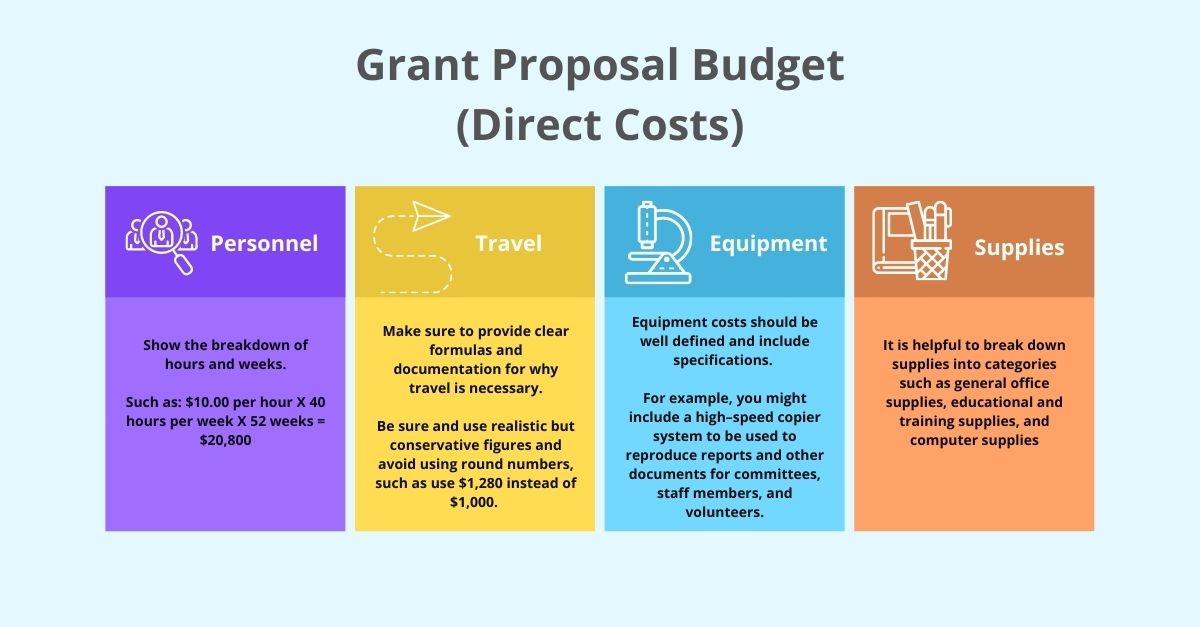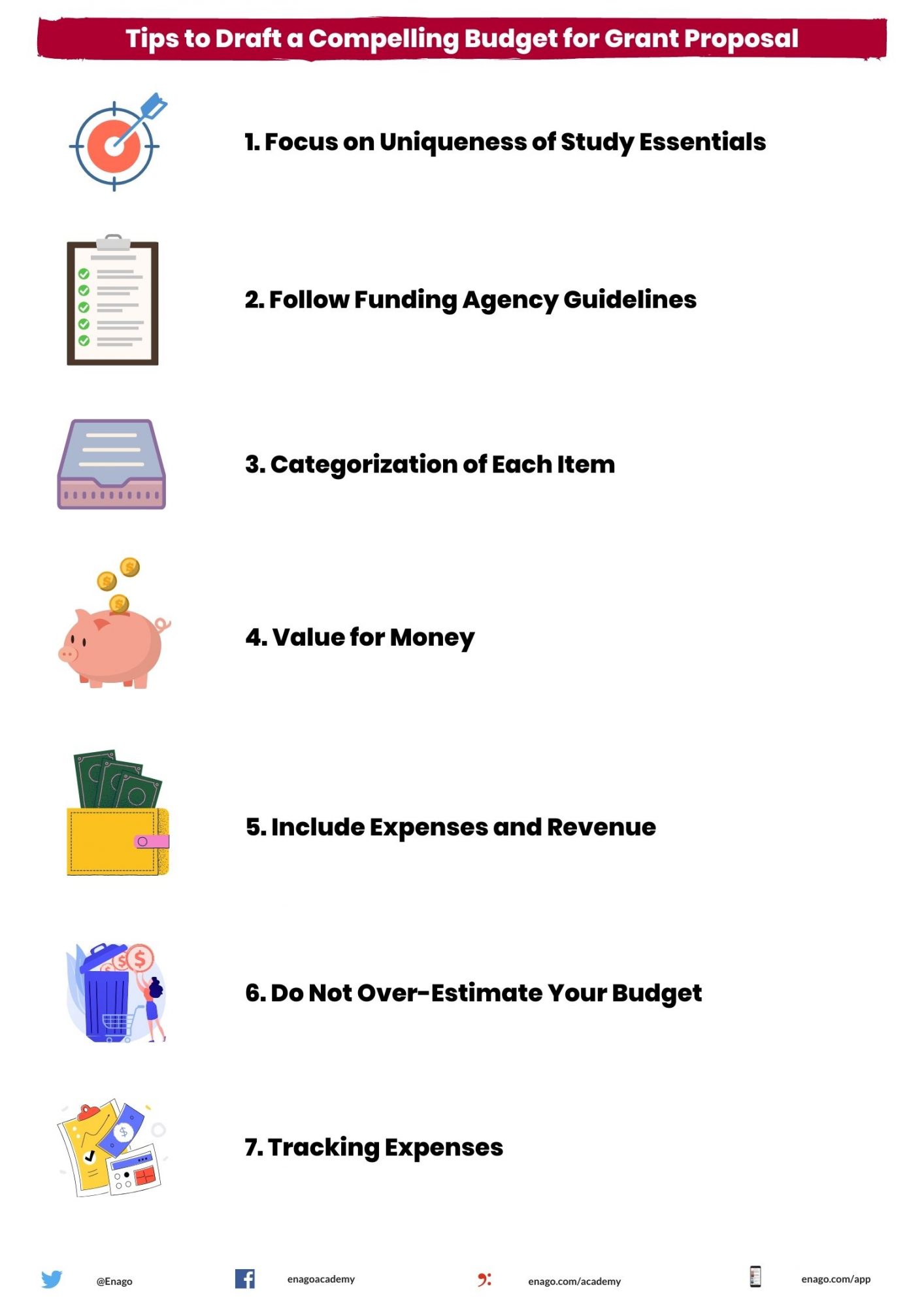7 Tips to Draft a Compelling Budget for Grant Proposal

While financial support is crucial for conducting research, acquiring funds for your research is a challenging task and so is planning the budget for grant proposal!
The key requisites of a successful grant proposal are:
- Uniqueness of the research problem
- Best possible plan for solving the problem
- Appropriate budget planning
In an attempt to grab the attention of funders, researchers strive to submit innovative research proposals and often overlook other elements when creating a successful grant proposal. One such neglected section is the budget for grant proposals. It is important for funders to know how finances are being utilized. Therefore, adequately estimating how much the project will cost and how the finances will be distributed can make all the difference. In simpler words, your grant proposal must explain your request in both textual and numeral forms.
It is often a challenge for budding researchers to present an estimated cost of their research. However, remember that the grant budget is not an organizational budget! Furthermore, in today’s age of stiff competition, even senior researchers will benefit from improving their budgeting skills. In this article, we will discuss ways on how to draft a compelling budget for grant proposal.
Why is the Budget Section Important for a Grant Proposal?
A grant budget is important to paint the financial picture of your research proposal to the funders. The budget for grant proposal provides the following:
- Details of the possible expenditures for the proposed research project.
- Reassurance to funders that the researchers have a realistic sense of the expenses to complete the work proposed.
- List of other income sources for costs not covered in the grant proposal.
- Guarantees an optimal use of the funds.
- Makes practical implementation of the research project smoother.
What Constitutes a Budget for Grant Proposal?
An estimated budget quantifies the financial plan for possible expenses during the research project. The budget for grant proposals must demonstrate and serve a plan for funders on how the researcher/s will utilize the money for both operational aspects of the project and miscellaneous expenses associated with the research.
In order to stand out from other applicants, researchers can customize the budget for grant proposal as per the funding agencies’ guidelines. However, the major elements of the budget plan comprise two broad categories: Direct and Indirect Costs
- Direct Costs
Direct costs are perhaps the most critical part of your budget section. These expenses are solely incurred for executing your research. It broadly includes expenses towards:
- Personnel (payroll)
- Materials
- Equipment
- Consumables
- Travel
Furthermore, direct costs are sub-categorized into the below two forms based on their occurrence during the research:
- Recurring expenses
- Non-recurring expenses
- Personnel:
As human resources are required for the study, salaries with allowances must be budgeted as per funding agency guidelines. The human resources may include personnel such as site manager, research assistant, junior research fellow (JRF), senior research fellow (SRF), research associate, technician, or data entry operator, and attender.
- Recurring expenses:
These expenses are variable and may keep on occurring throughout the study period. Consumables, chemicals, glassware, laboratory test charges, diagnostic kits, stationery, prints, photocopies, communication, postage, telephone charges, survey tools, questionnaires, publication charges, reprints, binding, etc. are some of the particulars in this category. Additionally, recurring expenses could also include allowances for patients/participants, food charges, and medical charges.
- Non-recurring expenses:
These are expenses that are one-time in nature and do not recur at regular intervals throughout the research duration. Equipment or instruments along with its accessories, software programs, computers, printers, electronic accessories of existing instruments in your lab, etc. are some of the particulars covered under non-recurring expenses.
- Traveling expenses:
Travelling expenses can be used for attending meetings, conferences, workshops, and training programs relevant to your research study. Some funding agencies allow both foreign and domestic travel, whereas, some do not. You can mention traveling expenses for collection of data, survey, and visit to other centers in a multi-centric study in this sub-section.
The detailed budget for grant proposal should be clear, well organized and easy to understand. Below is an example for grant proposal. The costs described below are direct costs:

- Indirect Costs
These do not directly attribute to specific expenses of a research, but rather act as an accomplice to run a project. These are also termed as overhead charges. Particulars such as electricity bill, water, library membership, accommodation charges, administrative charges, etc. are included in indirect costs. Generally, about 5–15% of the total budget is provisioned as overhead charges, which is credited to the institution directly. However, this range may vary as per the funding agency.

Tips to Draft a Compelling Budget for Grant Proposal
So when does your budget planning begin? It’s usually when you have your research question and a suitable study design ready!
Here are seven top tips to follow whilst drafting a compelling budget for grant proposal:
- Focus on Uniqueness of Study Essentials
Study design, testing procedures, sample collection methods, and research settings are the essential factors that need to be focused on to resolve the research problem. The uniqueness and complexity of these essentials increases the chances of being incorporated in the budget.
- Follow Funding Agency Guidelines
You must abide by the budget rules and limitations provided by your potential funder and draft the budget accordingly. Scrutinize each instruction and do not deviate from its actual meaning. Most importantly, stick to the list of requisites provided by the funding agencies.
- Categorization of Each Item
Breakup all particulars with their costs under related categories as mentioned earlier. Furthermore, follow an item-wise and year-wise tabulation method to present your budget.
- Value for Money
Funders like to see that the investigators are valuing the finances provided and not splurging on irrelevant particulars. For instance, you must mention if you can redirect resources such as equipment or instruments that are already available from your previous study and can be used in your present study.
- Include Expenses and Revenue
While you are seeking for funds, the funder is interested in investing in projects that bring other resources to the table. Owing to this, your budget section must include two sections:
- Expenses
- Revenue
Inclusion of expenses is obviously the major part of the budget section. Likewise, mentioning revenue in this case means other sources that will pay for your research.
You’d wonder—why do the potential funders care about where the other money is coming from? Well, it is to instill trust in the funders. Acquiring some or most of the needed funds gives credibility to your research and ensures the funder that organizations are willing to invest in non-profit research.
- Do Not Over-Estimate Your Budget
It is critical to base your budgeted expenses on the true costs of your project requisites. But pulling numbers out of thin air will lead to confusion and tally errors. Make sure that you find the cost of all particulars from trusted sources and quote them accurately in your budget. Avoid over-estimating your budget, as it may repel the funder. As you know, “something is better than nothing”! So stick to the narrative of your research and align the budget of grant proposal to it. Subsequently, it is important to keep in mind that a very low budget will raise eyebrows to suspicion. Thus, make sure what you request for is reasonable.
- Tracking Expenses
Describe your methodology to track the expenses throughout the project. You must mention how you plan to effectively manage your expenses and review them. Additionally, give references of some tools that you will be using to manage your finances.
Have you been facing challenges in drafting the budget for grant proposal? What did you do to improve your budgeting skills? Try these tips while drafting the next budget for your grant proposal and let us know how it works out for you and your colleagues.










Hi , can i please get a template? for research grant